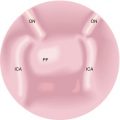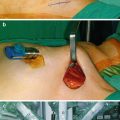John C. Watkinson and David M. Scott-Coombes (eds.)Tips and Tricks in Endocrine Surgery201410.1007/978-1-4471-2146-6_26
© Springer-Verlag London 2014
26. Voice Change Following Thyroid and Parathyroid Surgery
(1)
ENT Department, Medway Maritime Hospital, Gillingham, Kent, ME5 8NY, UK
(2)
Department of Otolaryngology, Head and Neck Surgery, Royal Sussex County Hospital, Eastern Road, Brighton, BN2 5BE, UK
Abstract
Some temporary voice change following thyroid or parathyroid surgery is common (up to 30 %)
Definition
Some temporary voice change following thyroid or parathyroid surgery is common (up to 30 %).
Permanent change occurs in around 10–15 % of thyroid operations.
There is controversy over the definition of “permanent” – but voice change persisting more than 12 months after surgery is most common definition.
Mild changes in voice may not require any active management. The need for intervention often depends on the occupation of the patient.
Where thyroid or parathyroid surgery results in a change in voice, it is usually an adverse change. However, occasionally, the voice may be improved.
A normal subjective postoperative voice does not exclude the presence of nerve damage.
Causes
Local mechanical (direct, traction) or thermal nerve damage at operation. Nerves at risk are:-
Recurrent laryngeal. Note that around 40% of laryngeal nerves bifurcate before they enter the larynx and in these the motor fibers are probably in the anterior branch. Be aware of anatomical variations including early bifurcation and the importance of identifying the nerve in all cases.
External branch of the superior laryngeal nerve.
Pharyngeal nerve plexus.
Secondary to the thyroid/parathyroid pathology, e.g., tumor infiltrating nerve and pressure on nerve. There are usually preoperative voice changes.
Effect of intubation on larynx including localized edema and dislocation of the arytenoid cartilage.
Direct or indirect trauma to local tissues, e.g., stretching/incision of strap muscles and postoperative scarring.
Hypothyroidism following surgery without adequate hormonal replacement.
Functional (psychogenic) dysphonia related to the surgery or the underlying diagnosis – this is rare.
Effects
While many patients may be totally unaware of or tolerate minor temporary voice change, in some there will be significant adverse effects on the quality of life and/or the ability to continue in employment. This is especially true of occupations with considerable voice use (professional voice users) and patients who sing either professionally or as a hobby.
Bilateral vocal cord palsy is rare but can occur. There is usually immediate stridor in recovery and urgent treatment is required.
Surgeon’s Legal Responsibilities
All surgeons undertaking thyroid and/or parathyroid surgery should ensure that:
Patients are counseled about the risk of temporary or permanent voice change. The majority of thyroid and parathyroid surgery is elective (planned) surgery, and this allows counseling to take place well before the date of surgery.
Stay updated, free articles. Join our Telegram channel

Full access? Get Clinical Tree





